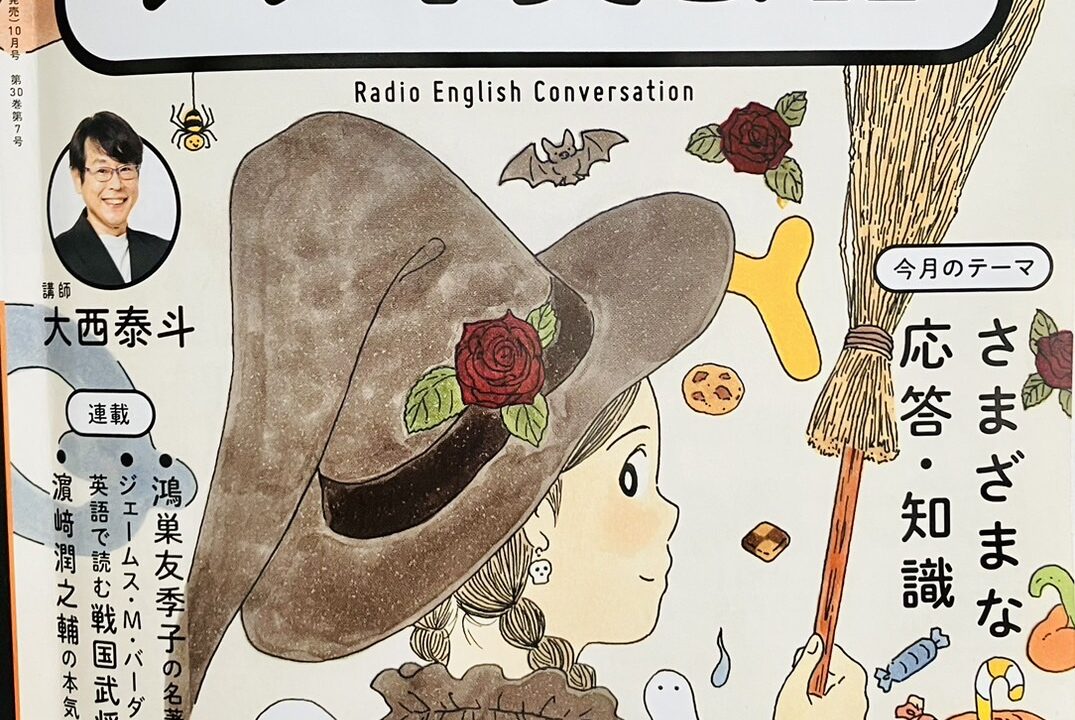【ラジオ英会話】Lesson 139 発言タイプ:知識④表現するのが難しい知識 – October 26・November 2 Thursday, 2023

October 26・November 2 Thursday, 2023
Lesson 139 発言タイプ:知識④表現するのが難しい知識
☆Words & Phrases
Mr. Emori, the leaves are changing color already in Hokkaido. – I heard.
**take a trip:
How about taking a trip there soon? – Where in Hokkaido?
Maybe…Wakkanai? – Wakannai? You don’t know? – Very funny.
They sound similar to me.
**work out well:
That works out well, then.

☆Grammar and Vocabulary
① How about taking a trip there soon?
How about ~?
How about ~?(~はどうでしょう?)は、軽い提案や意見を尋ねる表現。非常に頻度が高く、慣れておく必要あり!
頻度の高さには about 以降に取ることのできる形式の自由さも寄与している。この文のように動詞 -ing形のほか、名詞、フルセンテンスも使うことができる。
【名詞】
How about a trip there?
【フルセンテンス】
How about we take a trip there?
② You should bring a warm jacket and a sweater.
shouldのイメージ
should はこの文の「~するべき(助言)」と「~するはず(確信)」の2つの使い方がある。どちらの意味もそのイメージ「進むべき道」から生まれている。
「この道を進みなさい」と考えれば「べき」が生まれ、
「事態はこの道に沿って展開していく」と考えれば「はず」が生まれる。
It shouldn’t be a problem.
助動詞学習もイメージで!
友だち追加でLINEにラジオ英会話で学んだフレーズを実際のビジネスシーンで使うための方法、そして放送のまとめが届きます。
lt can get very cold at night there.
助動詞 canのイメージは「潜在」
対象物に秘められた能力(~できる)、自由度(~していい)の他、この文に見られる 「潜在的な可能性(~しうる・時に~することもある)」も表す。
知識の中には、他にも「真理」「法則」など、表現がやっかいなものがいくつかある。
① My boss can be stubborn at times.
That can’t be right.
→ 潜在的な可能性の例
否定文で使われると、どう目を凝らしてもそうした可能性がない(はずがない)となる
② Humans are social animals.
Time is money.
Beavers build dams.
One plus two is three.
I jog every morning.
→ 恒久的な真理、習慣は、現在形が得意とする領域。現在形は「広く安定した状況」を表すが、それが「常に当てはまる状況」に使われている
④ Accidents will happen.
Problems will arise.
My sister will talk for hours.
My dad would often take us fishing.
→ 法則は will の得意な領域。
willのイメージは「見通す」
そこから「見通すことができる=法則」の使い方が生まれている。
ことわざなどに見られる 「~するものだ」や「よく~する」といった習慣「~したものだ」という過去の習慣を表すことができる
★Practice
D: Okay everyone. It’s time for today’s practice.
R: For today’s practice sentences, I want you guys to pay attention to which sentences are used for which scenarios, okay?
D: All right. Our first sentences use “can” and “can’t” just like we did previously. So listen to how I use them and practice the sounds together with me.
– My boss can be stubborn at times.
All right. Now let’s try “can’t.”
– That can’t be right.
R: Okay, let’s continue,
– Humans are social animals.
– Time is money.
– Beavers build dams.
– One plus two is three.
– I jog every morning.
D: All right. And let’s try a few here the end.
– Accidents will happen.
– Problems will arise.
– My sister will talk for hours.
– My dad would often take us fishing.
R: You guys did absolutely great!
D: Really nice work!
☆Typical Expressions in Action
①階段を下りるのを気をつけて。雨が降るとかなり滑りやすくなることがあるから。
**slippery:
②イヌはすばらしいペットになりますよ。

③私の母は、毎週末に農産物直売所に連れていってくれたものです。
★Ending
D: Hey Roza. I wrote a haiku about today’s lesson. Do you wanna hear?
R: Yeah, sure.
David:
Mr. Emori
Do I need to bring a coat?
Wakkanai
What do you think, sensei?
October 26・November 2 Thursday, 2023
Lesson 139 発言タイプ:知識④表現するのが難しい知識
(日本語訳・解説付き)
☆Words & Phrases
Mr. Emori, the leaves are changing color already in Hokkaido. – I heard.
エモリさん、もう北海道では紅葉が始まっていますよ – そのようですね。
※もう紅葉が始まっている → the leaves are changing color already と言っていますね。覚えておきたい言い回しです!
**take a trip: 旅行する
How about taking a trip there soon? – Where in Hokkaido?
近いうちにそこ(北海道)に旅行をするというのはどうでしょう? – 北海道のどこへ(どの辺りに?)
※ Where in Hokkaido?(北海道のどこ?)は便利な表現です!Where in ○○?で「○○のどこ?」です。覚えておきましょう!
Maybe…Wakkanai? – Wakannai? You don’t know? – Very funny.
そうですねぇ…稚内? – ワカンナイ?あなたは分からないのですか? – なかなか面白いですね。
※ Very funny. は「とても面白い」ですが、しばしば相手のつまらない言動への皮肉としてもよく使われます!
They sound similar to me.
それらは私には同じように聞こえます。
※説明型オーバーラッピング(SVC)の文です。They = similar に聞こえる(sound)ということですね!
**work out well:(物事が)上手くいく
That works out well, then.
それなら、問題ないですね。

☆Grammar and Vocabulary
① How about taking a trip there soon?
近いうちにそこに旅行をするというのはどうでしょう?
How about ~?
How about ~?(~はどうでしょう?)は、軽い提案や意見を尋ねる表現。非常に頻度が高く、慣れておく必要あり!
頻度の高さには about 以降に取ることのできる形式の自由さも寄与している。この文のように動詞 -ing形のほか、名詞、フルセンテンスも使うことができる。
【名詞】
How about a trip there?
そこに旅行するというのはどうでしょう?
【フルセンテンス】
How about we take a trip there?
私たちがそこに旅行するというのはどうでしょう?
② You should bring a warm jacket and a sweater.
あなたは、暖かいジャケットとセーターを持ってくるべきです。
shouldのイメージ
should はこの文の「~するべき(助言)」と「~するはず(確信)」の2つの使い方がある。どちらの意味もそのイメージ「進むべき道」から生まれている。
「この道を進みなさい」と考えれば「べき」が生まれ、
「事態はこの道に沿って展開していく」と考えれば「はず」が生まれる。
It shouldn’t be a problem.
それで問題はないはずです。
助動詞学習もイメージで!
友だち追加でLINEにラジオ英会話で学んだフレーズを実際のビジネスシーンで使うための方法、そして放送のまとめが届きます。
☆Typical Expressions
lt can get very cold at night there.
そこでは夜、とても寒くなることがあります。
助動詞 canのイメージは「潜在」
対象物に秘められた能力(~できる)、自由度(~していい)の他、この文に見られる 「潜在的な可能性(~しうる・時に~することもある)」も表す。
知識の中には、他にも「真理」「法則」など、表現がやっかいなものがいくつかある。
① My boss can be stubborn at times.
私の上司は時折頑固になることがある。
That can’t be right.
それが正しいわけがない。
→ 潜在的な可能性の例
否定文で使われると、どう目を凝らしてもそうした可能性がない(はずがない)となる
② Humans are social animals.
人間は社会的動物です。
Time is money.
時は金なり
Beavers build dams.
ビーバーはダムを作る。
One plus two is three.
1足す2は3(1 + 2 = 3)
I jog every morning.
私は毎朝ジョギングします。
→ 恒久的な真理、習慣は、現在形が得意とする領域。現在形は「広く安定した状況」を表すが、それが「常に当てはまる状況」に使われている
④ Accidents will happen.
事故は起こるものです。
Problems will arise.
問題は起こるものです。
My sister will talk for hours.
私の妹は何時間も話します
My dad would often take us fishing.
父は私たちをよく魚釣りに連れていってくれました。
→ 法則は will の得意な領域。
willのイメージは「見通す」
そこから「見通すことができる=法則」の使い方が生まれている。
ことわざなどに見られる 「~するものだ」や「よく~する」といった習慣「~したものだ」という過去の習慣を表すことができる
★Practice
D: Okay everyone. It’s time for today’s practice.
R: For today’s practice sentences, I want you guys to pay attention to which sentences are used for which scenarios, okay?
D: All right. Our first sentences use “can” and “can’t” just like we did previously. So listen to how I use them and practice the sounds together with me.
– My boss can be stubborn at times.
All right. Now let’s try “can’t.”
– That can’t be right.
R: Okay, let’s continue,
– Humans are social animals.
– Time is money.
– Beavers build dams.
– One plus two is three.
– I jog every morning.
D: All right. And let’s try a few here the end.
– Accidents will happen.
– Problems will arise.
– My sister will talk for hours.
– My dad would often take us fishing.
R: You guys did absolutely great!
D: Really nice work!
☆Typical Expressions in Action
①階段を下りるのを気をつけて。雨が降るとかなり滑りやすくなることがあるから。
Be careful going down the stairs. They can get pretty slippery when it rains.
**slippery: 滑りやすい
②イヌはすばらしいペットになりますよ。
Dogs make great pets.
※ make の使い方がよく分からない場合はコチラを復習してみてください

③私の母は、毎週末に農産物直売所に連れていってくれたものです。
My mom would take me to the farmer’s market every weekend.
★Ending
D: Hey Roza. I wrote a haiku about today’s lesson. Do you wanna hear?
R: Yeah, sure.
David:
Mr. Emori
Do I need to bring a coat?
Wakkanai
What do you think, sensei?
名古屋駅前にあるビジネス英語&仕事での英語雑談力をつけるための「名古屋BEGビジネス英会話ジム」
営業時間:平日 9:00~22:00 土曜日 9:00~19:00(日祝休み)
〒450-0002 愛知県名古屋市中村区名駅2丁目40-16 名駅野村ビル 5階




